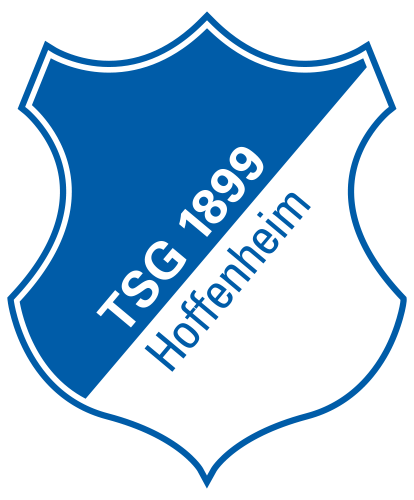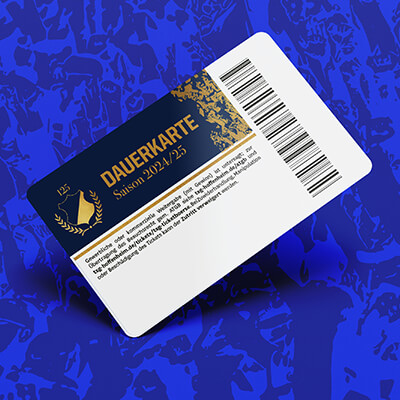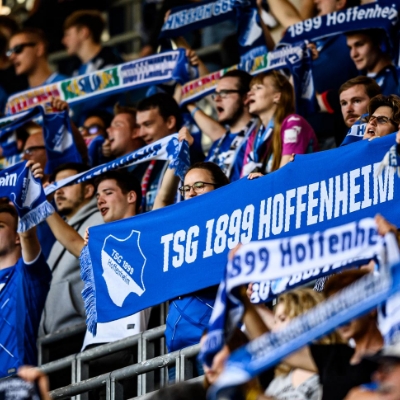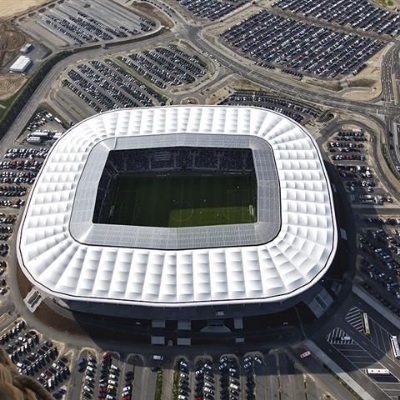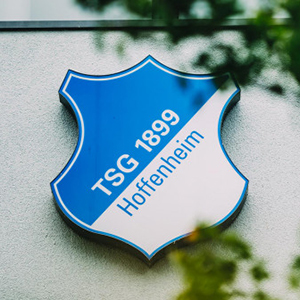TSG goes #WEURO: All the info on the European Championships
The Hoffenheim representatives
Nicole Billa, Austria
It's not only at TSG that Nicole Billa gets amongst the goals: the 26-year-old is a regular for the Austria women and has netted 42 goals in 78 appearances for the senior national team. Billa is just six goals away from overtaking record-holder Nina Burger as the ÖFB's all-time top-scorer. The Kufstein native already represented Austria at the 2017 European Championships, where she played every match. Billa, who has played for TSG since 2015, made her debut for the national team in 2013 at the age of just 17.
Katharina Naschenweng, Austria
Katharina Naschenweng already has 27 senior appearances and three goals for the Austrian national team under her belt. The 24-year-old did make the squad for the 2017 European Championships but did not feature at the tournament in the Netherlands. Naschweng made her first senior international appearance in June 2016. National team coach Irene Fuhrmann tends to use the Hoffenheim player mostly on the left of the attack and she is likely to be included in the starting XI at the upcoming EUROs.
Julia Hickelsberger, Austria
Hoffenheim's new summer signing, who joins from St. Pölten, fought her way back into the national team this spring following a serious knee injury. The 22-year-old attacking player has made five appearances for the ÖFB women since February, taking her overall tally to 17 senior caps. She has scored five goals for her country. Hickelsberger will be hoping to get her first taste of a major tournament at the European Championships.
Celina Degen, Austria
Central defender Celina Degen will lace her boots for 1. FC Cologne next season, but first up she is off to the European Championships. The 21-year-old made her debut for the national team in November 2021 and followed it up with her first goal in an Austria shirt this April. She got lots of playing time under her belt in the run-up to the EUROs and was rewarded for her good performances with a place in the squad.
Luana Bühler, Switzerland
Defender Luana Bühler has made the Switzerland squad for a major tournament for the first time, having not made her debut for her country until one year after the 2017 European Championships. The 26-year-old Hoffenheim player has since made 29 appearances for Switzerland and she is expected to be a first choice centre-back in England, having featured at the heart of defence in the final EURO warm-up games against Germany and England.
Tine De Caigny, Belgium
Tine De Caigny was the top-scorer in EURO qualification, netting 12 goals. The Hoffenheim forward is one of the key players for the Belgian women's national team and was named the Belgian Women's Footballer of the Year in 2020. The attacker took part in the 2017 European Championships for her country and played in all three group games. Her debut for the senior national team came back in 2014. She has now scored 37 goals in 75 international appearances.
Jule Brand, Germany
Future Wolfsburg player Jule Brand was the only TSG player from last season to make the final Germany squad. Aged 19, she is the spring chicken in the national team and only made her debut in April 2021. A Hoffenheim youth product, the attacking player has already scored five times in 16 appearances and is expected to get some minutes under her belt at the European Championships. In Lena Lattwein and Tabea Waßmuth, there are two other ex-Hoffenheim players in the DFB squad for the EUROs.
The format
Divided into four groups of four, a total of 16 teams will take part in the European Championships in England and compete for a place in the quarter-finals. The top two countries in each group will qualify for the knockout rounds. The Hoffenheim ladies will not go head-to-head in the group phase, with the four countries with TSG players each drawn in a different group. Austria have been drawn in Group A alongside hosts England, while the Germany women are together with Denmark, Spain and Finland in Group B. Switzerland will be up against Portugal in their opening game, while Belgium have been handed a tough group alongside France, Italy and Iceland.
Group A: England (hosts), Austria, Norway, Northern Ireland
Group B: Germany, Denmark, Spain, Finland
Group C: Netherlands (reigning champions), Sweden, Portugal, Switzerland
Group D: France, Italy, Belgium, Iceland
The reigning champions
The Netherlands became only the fourth country to be crowned European champions in 2017, with the host nation running out 4-2 victors against Denmark in front of 28,000 fans in the final. That victory saw the Dutch ladies dethrone their German counterparts, who won the tournament six times in succession between 1995 and 2013. That makes Germany the country with the most titles (eight).
The fixtures
Group stages:
Wednesday 6 July at 21:00 CET: England vs. Austria
Friday 8 July at 21:00 CET: Germany vs. Denmark
Saturday 9 July at 18:00 CET: Portugal vs. Switzerland
Sunday 10 July at 18:00 CET: Belgium vs. Iceland
Monday 11 July at 18:00 CET: Austria vs. Northern Ireland
Tuesday 12 July at 21:00 CET: Germany vs. Spain
Wednesday 13 July at 18:00 CET: Sweden vs. Switzerland
Thursday 14 July at 21:00 CET: France vs. Belgium
Friday 15 July at 21:00 CET: Austria vs. Norway
Saturday 16 July at 21:00 CET: Finland vs. Germany
Sunday 17 July at 18:00 CET: Switzerland vs. Netherlands
Monday 18 July at 21:00 CET: Italy vs. Belgium
Quarter-finals:
Wednesday 20 July at 21:00 CET: Winner of Group A vs. Runner-up of Group B
Thursday 21 July at 21:00 CET: Winner of Group B vs. Runner-up of Group A
Friday 22 July at 21:00 CET: Winner of Group C vs. Runner-up of Group D
Saturday 23 July at 21:00 CET: Winner of Group D vs. Runner-up of Group C
Semi-final:
Tuesday 26 July at 21:00 CET: Winner of QF 3 vs. Winner of QF 1
Wednesday 27 July at 21:00 CET: Winner of QF 4 vs. Winner of QF 2
Final:
Sunday 31 July at 18:00 CET: Winner of SF 1 vs. Winner of SF 2
The venues
Manchester (Old Trafford, 74,000)
Manchester United's home stadium was opened in 2010 and is the largest club stadium in Great Britain. Manchester will play host to the opening game of the EUROs between hosts England and Austria on 6 July.
Brighton & Hove (Brighton & Hove Community Stadium, 30,000)
The stadium is located in the vicinity of the English village Falmer, around 10 kilometres from the city of Brighton. Two group games – including Austria's clash with Norway – will be played there, as well as one of the quarter-finals.
London (Brentford Community Stadium, 17,000 & Wembley Stadium, 89,000)
The stadium in the London district of Brentford has been the new home venue of both the football club Brentford and the rugby union club London Irish since 2020. The DFB women will play two of their group matches in this stadium, while another fixture in Group B and one of the quarter-finals will take place there. Only the final will be played at Wembley Stadium in London.
Manchester (Manchester City Academy Stadium, 4,700)
The Academy Stadium is situated just across a bridge from Manchester City's stadium and was opened in 2014. Three group games will be played in Manchester, including two of the Belgian national team's fixtures.
Milton Keynes (Stadium MK, 30,000)
The Stadium MK is a football stadium in Bletchley, which is part of Milton Keynes. It was inaugurated in 2007 and is the home stadium of Milton Keynes Dons. The DFB women will play their third group game there, with a semi-final also set to take place in Milton Keynes.
Rotherham (New York Stadium, 12,000)
The stadium in South Yorkshire, which was opened in 2012, is home to Rotherham United. The French team will play all three of their group games there, including the one against Belgium. One of the quarter-finals will also be played in Rotherham.
Sheffield (Bramall Lane, 30,000)
Opened in 1855, Bramall Lane is the stadium belonging to football club Sheffield United. It is the oldest stadium in the world which still plays host to professional football. Switzerland will contest two of their group games in Sheffield, which will also play host to one of the semi-finals.
Southampton (St Mary's Stadium, 32,000)
The stadium on the south coast was opened in 2001 and is the home stadium of Southampton. Austria will take on Northern Ireland at St. Mary's Stadium.
Wigan & Leigh (Leigh Sports Village)
The stadium was opened in 2008 as the home of Leigh Centurions and was also a venue at the 2013 Rugby World Cup. In 2018, it became the home venue of the Manchester United women's team. Switzerland will play their opening group game against Portugal at Leigh Sports Village.
The base camps
The Austrian squad will be based at the Pennyhill Park Hotel, which is located in Bagshot in the county of Surrey, approximately one hour from London by car. The Germany women have moved into their European Championship base camp in London: the Hilton London Syon Park is nestled in a spacious park in the west of the capital city. The Swiss team are based in Leeds and are training at the Rothwell Juniors facility in West Yorkshire. The Belgians are based in Wigan.
The live broadcasts
All 31 matches at the European Championships in England will be broadcast live. All games are available via live-stream on ARD and ZDF, while 14 of the 24 group fixtures will also be shown on live television. The broadcasts for the knockout rounds have not yet been determined. All matches at the EUROs can also be watched on DAZN.



